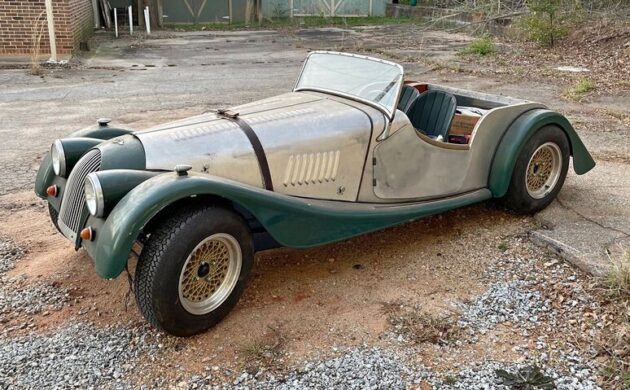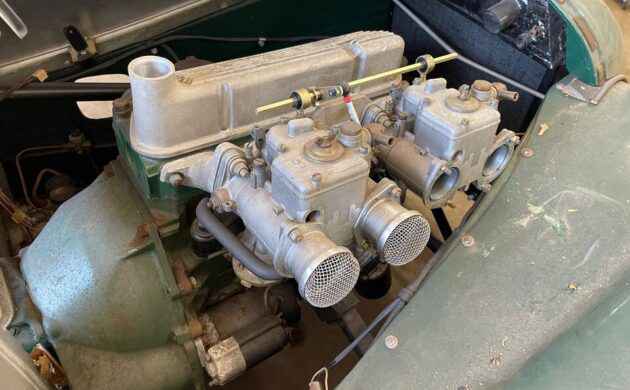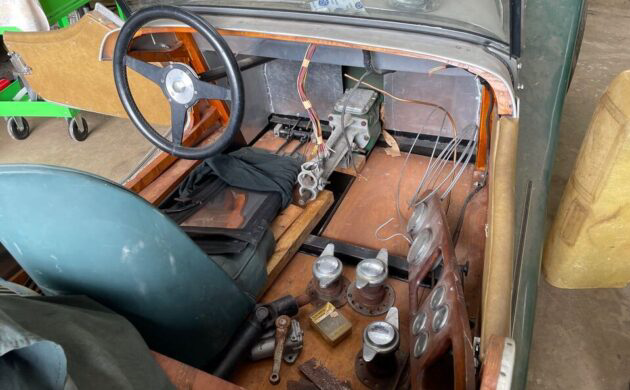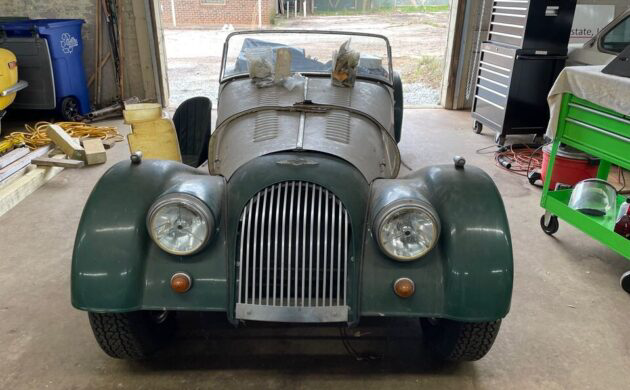Race Car Project? 1962 Morgan 4/4
The Morgan 4/4 was launched in 1936 as a two-seater and other than a hiatus during WWII, production ran until 2018. No other car model has had as long a run as the 4/4. With an ash body skeleton laid over with aluminum panels, the curb weight comes in at 1600 lbs. By the mid-1950s, the cars were powered by small Ford four-cylinders. Blindingly fast they were not, but no one seemed to mind. Here on facebook Marketplace is a 1962 Morgan 4/4 project car, with an asking price of $9500. This car has no title, no VIN plate, and the seller cannot find the chassis stamp. It is sold on a bill of sale only. Should you spring for this (Christmas is coming!), you’ll pick it up in Atlanta, Georgia. Patrick S found this tip for us – thanks, Patrick!
The seller acquired this car from a fellow who in turn took it in payment for settling an estate. Apparently represented as a race car or hot-rod-in-the-making, the Morgan is fitted with two side-draft Webers. In this year, the factory motor was a 1.3-liter Ford in-line four-cylinder with 62 horsepower paired with a four-speed manual transmission. Engine swaps are common – the 95 hp 1.6-liter Ford Kent engine is popular. Front disc brakes were standard by 1962. The seller notes that the chassis appears to be new or restored. The sale includes an extra transmission, the aluminum bonnet panel that is made to clear the Webers (since the factory bonnet does not). and miscellaneous additional parts.
The interior is a work in progress. The dash and side curtains are with the car, but no doubt getting this car over the finish line is going to take money and time. These older British cars have several advantages though: they are simple as a stone, parts are plentiful, and club support is doubly plentiful. Best yet – Morgan is still in business today, which at least provides a cozy feeling if not some actual practical help.
The car sits low on its chassis, boosting the fun factor. Like the Bugeye, the Morgan has an appealing “face”, albeit one that could appear menacing when advancing behind you on the track. In factory trim, the 4/4 wasn’t the quickest Morgan ever made so it doesn’t command high prices today. Decent driver-quality cars sell for less than $30k; performance upgrades can bring the value up. The title battle lurking on this car might consign it to the track. In light of its condition and lack of documentation, what do you think of the price here?
Auctions Ending Soon
 2002 Subaru Impreza WRXBid Now1 days$333
2002 Subaru Impreza WRXBid Now1 days$333
 1975 Chevrolet Corvette ConvertibleBid Now1 days$4,000
1975 Chevrolet Corvette ConvertibleBid Now1 days$4,000
 1964 Ford F-100 Camper CustomBid Now1 days$2,000
1964 Ford F-100 Camper CustomBid Now1 days$2,000
 2006 Jeep Wrangler SportBid Now3 days$11,000
2006 Jeep Wrangler SportBid Now3 days$11,000
 1974 Datsun 260ZBid Now5 days$750
1974 Datsun 260ZBid Now5 days$750





Comments
For a Morgan that is straight, the price seems fair (in todays times). It all depends on what the new buyer plans for it. Twin side draft Webers seems an odd combination for a Morgan, but it was a race car. I never owned one but did caretake one for friend many years ago. I was able to drive it quite a lot. It only had 6K on it and I thought there was a problem with the trans as when I shifted into 2nd gear, it would grind. I soon learned that it was not a synchro mesh and thus learned the correct shifting protocol. ( Double clutching). Most interesting was the people that looked at it would say
” Nice MG!” Alas, the early plight of the Morgan……….
I’d love to see someone turn this thing into a rocket with an eco boost 4 or even better a Kseries swap
I was working in Barbados, managing a rental villa, when I found a complete & running 1969 +4 Morgan. I wanted to import the car to the USA but no matter how closely I searched, there was no evidence a VIN had ever been attached or even assigned to it. Barbados kept track of vehicles based on the license plate that stayed with the car, not the VIN. While the car had legal Barbados license plates, the government issued paperwork didn’t list a VIN.
When I contacted Morgan Car Co in England, they checked their records and let me know ONLY ONE Morgan was ever sent to Barbados and it was a DIY kit. The reason for the kit car was quite clear; The import taxes were terribly high at over 160 percent of the vehicle’s appraised value. Kit cars were a far lower tax rate. Morgan said it was common for them to sell complete kits, mostly for non-street use, but sometimes because of import tax issues.
Since this car is already in the USA, importation is not an issue. Obtaining a title will vary by state. It may still be possible to obtain a “duplicate VIN” from Morgan, but the buyer would need to discuss this with the company. While that had been suggested to me for the Barbados car, I declined to bring the car to the USA, and a lot has changed in regulating vehicle ID today, as compared to when I looked into it almost 40 years ago.
Always like the Morgan , when living in England I had a friend that had a3 wheeler Morgan, it was a fun. vehicle
Beware of cars with wooden frames.
Thomas,
Morgan cars have steel frames. That said, the majority of the bodies are fabricated out of white ash, with either a sheet steel skin or the optional aluminum outer shell.
The attached photo shows the main Morgan body assembly area prior to the metal skin application.
Engine should be a Triumph TR3A for a 1962 Morgan.
The Triumph TR3 engines were for the +/4, the 4/4 had a smaller engine.
The vin number is on the chassis cross member behind the seat. It is fairly faint and is only 4 to 5 characters long. Usually one letter and 4 numbers. With this info you can contact the Morgan Company and they have records of the car, what it came with, where it was shipped to. It does cost money for it.
Karl,
Until the UK government started requiring VIN info on all vehicles, kit cars were exempt from requiring a VIN, so if this Morgan was actually sold in kit form for racing, it may never have had one. If the chassis was sold as part of a kit, it was [for tax purposes] not a vehicle, hence the taxes were much lower.
I used to visit Morgan Motor Co each time I was in the area, and became friends With Charles Morgan, exchanging letters back & forth [remember them?] as we “talked cars”. The above info came directly from him.
Coming into the USA as a “bunch of spare parts” US Customs would have processed the paperwork as such, not as a vehicle.
My Morgan,1959 4/4, was shipped to Canada without the engine, trans, and drive shaft. On the chassis there is a number which is used in California as my vin number and it is only 5 digits long. I got the records from the Morgan factory and that was how it was sent.
Karl,
Knowing how the Morgan company operated back then, I’m not surprised. Perhaps the car was ordered as a kit car, but Canadian imports required a VIN for a “rolling chassis”.
As you probably know, Morgans have always been very bespoke, with no 2 exactly the same. Your car could have been shipped sans drive line because the new owner had plans on installing a different drive train, that situation was not uncommon for Mogs back then. In any case, since having the VIN, you will have easy access to the original build records.
On one of my visits to Pickersleigh road, I remember watching a big burly guy making the bonnet halves by hand. As they were curved to match the firewall and front grill shell, his assistant hand cranked the sheet rolling machine as the boss placed the bonnet half between the rollers using pencil marks to know where the curve should be, and created the basic curve. He would then remove it from the rollers and place one part against the base of his neck, with the other end in his raised hand. He would flex his arm and say either “Yes, that’s it”, or “No, got to tweak it some more”, No jigs, no precise measurements, he’d done them for so long that he just knew when it was right.
I owned a 1960 Morgan +4 for nearly 10 years and was the second owner. MIne had the Standard Vanguard engine, Moss racing box(no syncro 1st to 2nd or vice versa) with a Jag diff and was factory standard. I note that this model is referred to as a 4/4 which I had always believed to mean 4 wheels and 4 seat whereas the +4 meant 4 wheels. as a by the by I had owned a 3 wheeler with the twin Matchless out the front. Most people the MMs stood for Morgan Motor. The other variant was the twin JAPs.